
How to speak to your children about Organ Donation
How to speak to your children about Organ Donation
- 80% of adults in England say they would consider becoming a donor, but fewer than 42.5% have registered a decision, whatever it is, on the organ donation register
- 4% of organ donors in 20/21 were children aged 0-17
- More organ donations from children and young people are needed to save the lives of children, babies and even adults waiting for a lifesaving call
- Families will always be involved before donation takes place, so making your choice clear can provide peace of mind for your loved ones
N.B Organ donation laws vary across England, Scotland, Wales, and Northern Ireland. Visit https://www.organdonation.nhs.uk/uk-laws/ for more information.
Legal & General (L&G) has partnered with the NHS to encourage families to discuss the importance of organ donation. Whether it’s telling your loved ones about your own decision or educating the next generation about the choices they can make, it’s important to have an open and honest conversation.
In England, the new ‘opt out’ system was introduced last year, meaning that all adults are now considered willing to be an organ donor when they die, unless they have opted out or are in one of the excluded groups. Even though the law has changed, families will still always be consulted before organ donation goes ahead. For children (under 18 in England, 16 in Scotland) this decision will always rest with the child’s parents.
L&G wants to help support more families, of all ages, to have a conversation and register their organ donation decisions.
This sentiment is shared strongly by parents Jay and Sina Patel, whose three-year-old son, Aari, tragically died in 2016. After being told Aari wouldn’t survive, Jay and Sina made the instant decision to donate as many of their son’s organs as possible. Aari donated seven organs and saved the lives of two other children. Since then, both Jay and Sina have openly talked to their twins Iyla and Asha (age 6) about how their brother was able to give the amazing gift of life to others. For those families wondering how best to approach the conversation around organ donation with children, Jay told L&G:
“These subjects should not be a taboo that children fear, instead an explanation of life and celebrating those lives, whether lived short of long”. He adds “It is important to stick with the facts and remind your children it’s more than likely not to happen to you, or them, but may one day in the context of life and death... it’s not a subject that needs to be planned, but more integrated into a family conversation”.
It’s important to remember that these types of conversations can vary depending on family context and children’s development. For example, your child might speak about a lesson at school or when an older teen applies for their driving license, they will be prompted whether they want to register as an organ donor. This could be a great time to ensure they understand the importance of, and facts around, donation. For more information on how to approach these conversations with children, visit https://www.legalandgeneral.com/life-cover/life-insurance/talking-to-children-about-organ-donation
Whatever you decide, it is important for you to record your decision on the NHS Organ Donor Register. And whatever your own decision about organ donation, it is vital that you talk to your loved ones - so they can fully understand the decision and can be certain about what you want.
HAVING THE CONVERSATION
It’s currently estimated that 7,000 people, including 200 children are likely to be in need of a transplant across the UK. Blood, organ, and stem cell donation are now also being taught in schools for Key Stage 3 and 4, but how can parents approach these types of conversations at home?There’s a whole range of conversations that are important to have with children, that deserve to be dealt with sensitively. L&G partnered with child psychologist Angharad Rudkin to provide some expert comment and insight on having conversations with children on sensitive topics, such as organ donation.
She recommends the following tips on having effective conversations with children:
- Pick the right time – Choose a good moment when children aren’t too tired and hungry. Ensure you’re not taking them away from something they really enjoy, as they’ll then be more amenable to listen.
- Be mindful – As you’re talking, keep checking in with how they’re feeling – try asking ‘is this ok?’, ‘would you like me to stop?’ and ‘how are you feeling?’
- Schedule conversations – If they’re unresponsive or feeling particularly anxious, try discussing and arranging a new time together that would be more appropriate to return to the topic.
- Be self-aware – Understand that children take in as much from what you do as what you say. If you’re behaving in a calm, relaxed way then your child is more likely to respond in that way too. Don’t judge or criticise, let your child ask whatever question they would like, even if it does make you worry as a parent.
- Moving on – After the conversation is done, move on to an activity together such as making lunch, going for a walk, or watching a TV programme together. This will ease the transition back to everyday life and reassure the child that life will now go on as usual.














